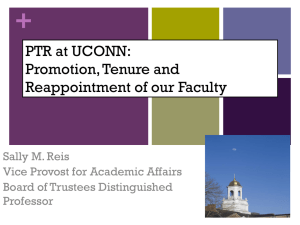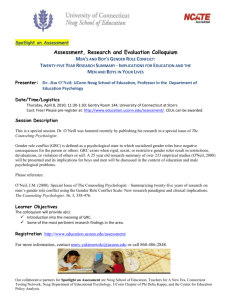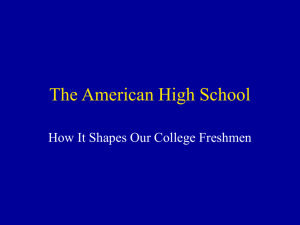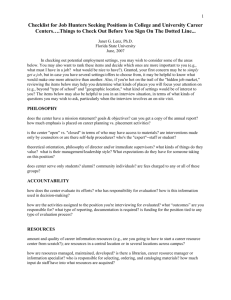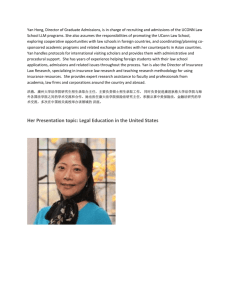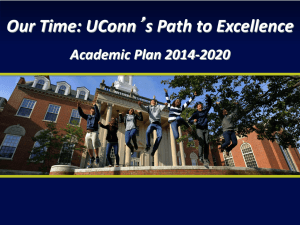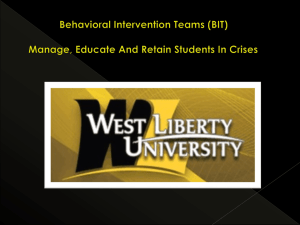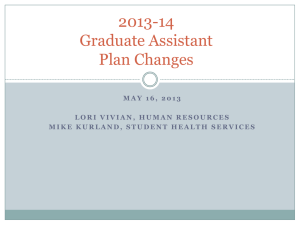Task Force Recommendations
advertisement
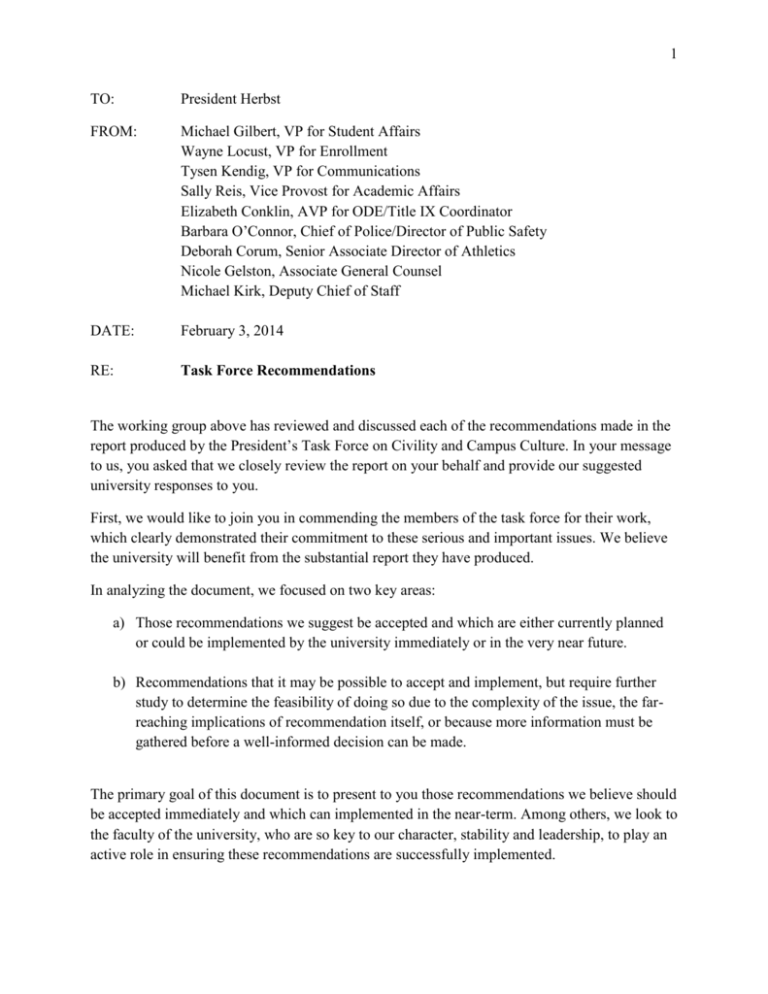
1 TO: President Herbst FROM: Michael Gilbert, VP for Student Affairs Wayne Locust, VP for Enrollment Tysen Kendig, VP for Communications Sally Reis, Vice Provost for Academic Affairs Elizabeth Conklin, AVP for ODE/Title IX Coordinator Barbara O’Connor, Chief of Police/Director of Public Safety Deborah Corum, Senior Associate Director of Athletics Nicole Gelston, Associate General Counsel Michael Kirk, Deputy Chief of Staff DATE: February 3, 2014 RE: Task Force Recommendations The working group above has reviewed and discussed each of the recommendations made in the report produced by the President’s Task Force on Civility and Campus Culture. In your message to us, you asked that we closely review the report on your behalf and provide our suggested university responses to you. First, we would like to join you in commending the members of the task force for their work, which clearly demonstrated their commitment to these serious and important issues. We believe the university will benefit from the substantial report they have produced. In analyzing the document, we focused on two key areas: a) Those recommendations we suggest be accepted and which are either currently planned or could be implemented by the university immediately or in the very near future. b) Recommendations that it may be possible to accept and implement, but require further study to determine the feasibility of doing so due to the complexity of the issue, the farreaching implications of recommendation itself, or because more information must be gathered before a well-informed decision can be made. The primary goal of this document is to present to you those recommendations we believe should be accepted immediately and which can implemented in the near-term. Among others, we look to the faculty of the university, who are so key to our character, stability and leadership, to play an active role in ensuring these recommendations are successfully implemented. 2 Education and Programing The report recommends: implementing a program of bystander training for all students; that the university review and revise its student orientation program with regard to timing and substance; offering student-oriented education programming on healthy relationships; expanding and enhancing student-orientated educational programming on sexual violence prevention; expanding educational programming on alcohol and drug abuse; repeating mandatory education on sexual violence prevention at different points during the student experience; and better advertising self-defense programs for students. These recommendations are the most critical in the Task Force report and would have the greatest impact on students and the student experience. We strongly suggest that each be accepted and implemented. Vice President for Enrollment Wayne Locust has already conducted a review of orientation. His own review, as well as the recommendations contained in this report should both be assessed as changes to orientation are contemplated. It should also be noted that the university is already in the process of assessing its drug and alcohol programming for students. It was also recommended that alumni be engaged and kept abreast of UConn’s core values and culture. This does take place currently in a variety of ways through the UConn Alumni Association. We agree that core values should be stressed in communications with alumni. Responsibility for implementation: VP for Student Affairs, Title IX Coordinator, VP for Enrollment Planning and Management, VP for University Communications Timeframe: If not already underway, planning for each should begin immediately. New, updated or enhanced educational programming and changes to orientation related to these recommendations should begin by the summer of 2014 and be in place by the fall of 2015. Safety The task force recommended increasing the human resources of the police department; assessing the policies associated with a nighttime van service and changing the perception of the Celeron Path, which has unfortunately been referred to as the “Rape Trail” by some students over time. 3 We support these recommendations, but would note that a police staffing proposal recommending additional officers has already been completed. Further, it should be noted that there is no empirical data to support the notion that students are at a greater risk of being the victim of a crime along the Celeron Path, including sexual assault. Nonetheless, its ugly moniker has persisted for many years and the name and perception should be addressed, ideally by UConn students. We would suggest that USG also lead on this effort with support by members of administration as appropriate and helpful to this important effort. The task force also recommended that the university implement a state-of-the-art safety communication system, assess the security of campus, utilize safety messages to keep the campus informed, and improve first responder training. The university already operates a modern communications system that allows it to communicate with the campus community in a variety of ways, including text message, in the event of an emergency. The university is already required by law to issue “timely warnings” to the campus in the event of a safety threat. A comprehensive security study of campus has recently been completed and Public Safety will work with the university community as it implements its recommendations. Finally, Public Safety recently invested resources for additional training, which is ongoing. Responsible for Implementation: VP for Administration, Chief of Police, Director of Logistics Administration, Undergraduate Student Government. Timeline: Decisions on increased police staffing and an assessment of van policies should be made prior to fall 2014; efforts to change the nickname and perception regarding the Celeron Path should begin immediately. Structural The task force recommended including student representation on various university committees, task forces, working groups, etc.; that the variety and avenues of student access to senior administration be increased; that a university-wide civility survey be undertaken; that the public service efforts of student-athletes be noted and publicized; that the university’s Title IX office have the resources necessary to comply with best practices with respect to staffing, policies and procedures; that the university explore an enhanced partnership with UConn Health Center to provide access to a Sexual Assault Nurse Examiner (SANE nurse); that gender-neutral restrooms be created in residence halls. 4 The task force also recommended that the university implement a single call number at UConn that would operate 24/7 and would answer student questions regarding all manner of health, safety and academic concerns. For all emergencies, students should call 911. Further, there are two existing 24/7 hotlines that students can utilize for specific purposes: the Sexual Assault Crisis Center for Eastern Connecticut and the hotline for the Domestic Violence Program of United Services, Inc. Additionally, an “on-call” therapist is available after-hours during the academic semester through the university’s office of Counseling and Mental Health Services, in addition to the staff available during normal business hours. However, this recommendation provides the basis to address a related concern, which is having a central or single point of contact for students who are victims of crimes. (This is not to be seen as something to utilize in lieu of contacting the police). This central point of contact would help students navigate their way through various processes and toward the resources and options that are available to them. This more focused goal is laudable and should be acted on. There is existing student representation on many university committees, task forces – including this one – as well as working groups and other ad hoc structures, and we clearly agree that student representatives should be included within similar bodies whenever appropriate in the future. The university is already in the process of hiring additional staff members for the Office of Diversity and Equity/Title IX Coordinator – a process that began last summer. Also, we believe that the public service contributions of all UConn students, including student-athletes, should be celebrated and publicized by the university, such as the very positive reaction from students when you asked that a “Day of Service” take place as part of the newly reimagined spring weekend. The university has already agreed to conduct a civility and climate survey, every four years, following the recommendations of a committee studying civility among employees. We note that you – President Herbst – have also already said a similar survey should be conducted among students; both can be combined, if possible. Finally, the university is already in the process of creating – and has already created – gender-neutral restrooms in certain university facilities and we will continue our commitment to leading in this area . With those refinements and notes regarding what is currently underway, we suggest that all of the above recommendations be accepted and implemented. Responsibility for Implementation: President, Provost, Office of Public Engagement, VP for Communications, VP for Student Affairs, Title IX Coordinator, VP for Administration and CFO, Director of Athletics. 5 Timeline: You indicated that a student survey on civility and climate would be undertaken in the fall of 2014; all other recommendations are ongoing. Values The task force recommended that UConn “Define the core values of the UConn community through an inclusive process of stakeholders” and that these values be promoted in a variety of different ways. In our view, “core values” must grow organically and be defined by those who hold and practice them – the stakeholders discussed in the report. We recommend acceptance of this recommendation, but would suggest that UConn students themselves determine what it means to be a Husky in theory and in practice, and that the university as a whole promote those values to our community. We also believe that faculty are critical to this process. Responsibility for Implementation: Undergraduate Student Government and key University Senate committees should lead this process; University Communications can assist in promotion once these values have been defined. Timeframe: This process should begin among students at the outset of the spring 2014 semester, and the conversation should be started by the USG president. Students themselves will determine the length of time this process will take; but believe that the upcoming academic semester should be sufficient time. It was recommended that the university create a “Husky Paw Print” program that recognized student achievement and contributions to the community. We suggest this recommendation be accepted, but integrated into existing awards and recognitions managed by the Office of Public Engagement in the context of the academic plan. We would also suggest that the dormant “UConn Medal” program, which recognized the contributions of the members of our community, be reactivated. Responsibility for Implementation: Office of Public Engagement, Division of Student Affairs, Provost Timeframe: Planning should begin immediately; the Husky Paw Print and UConn Medal program should be in place by the fall of 2014. Implementation The task force recommended that the resources needed to implement accepted recommendations be provided; that this plan for action and the report itself be widely 6 shared among members of the campus community; and that a faculty resource center for syllabi, core values, and content on civil debate be created. We suggest each be accepted. Responsibility for Implementation: President, Provost, VP for Student Affairs Timeframe: The need for resources is ongoing; this document and the task force report should be shared during the spring 2014 semester, preferably before mid-February, and the faculty resource center – which could be housed electronically on the Institute for Teaching and Learning’s website – should be ready by January 2015. Recommendations that require further review and study: Specific ways the “core values” of the university will be presented to the campus community; core values must first be determined. Responsible: VP for Student Affairs. Implementing a program of “courageous conversations” to discuss civility, campus climate, etc. This recommendation is highly specific but may be taking place currently in another form. Responsible: VP for Student Affairs Annually assessing student learning about healthy relationships, prevention of sexual violence, alcohol and drug abuse. “Assessment” is a word used in the field of social science that is associated with specific meanings and processes. In this instance, determining what specifically would be “measured” and how this could be done accurately is a complex issue. Responsible: Provost, Title IX Coordinator, VP for Student Affairs Enhancing the FYE program to include new content. This would also be a complex, longterm undertaking with numerous variables that require further study. Responsible: Provost. Enhance community policing. This would be contingent on the issue of human resources. Responsible: VP for Administration, Chief of Police. Create a new undergraduate General Education Competency in civility discussion and debate; create a “life skills” competency to address health, sexuality, safety and relationship through courses. These recommendations will depend upon University Senate action and require further study and discussion. Responsible: University Senate, Provost Provide faculty with resources that will help them promote UConn’s core values and teach the techniques of civil discourse and debate. Core values would first have to be established, so this could be undertaken in sequence. Responsible: Provost, University Senate. Revise all web-based resource pages for clarity, usability and specificity of direction. The university must do this as a matter of course and to comply with federal law; however, the pages that relate to key student services should be evaluated to ensure that are as clear 7 and user-friendly as possible. Responsibility: VP for Student Affairs, Title IX Coordinator, UITS, VP for University Communications Employ a mental health trauma specialist; increase availability of mental health services to all students on all campuses. The mental health offerings for students are currently being examined with the goal of adding resources to this key department. Mental health services currently offered at regional campus must be assessed. Responsible: VP for Student Affairs.
